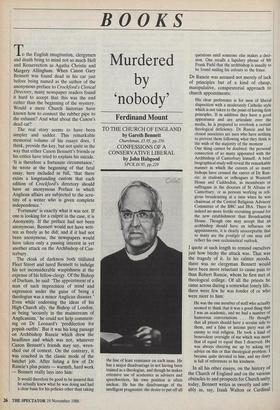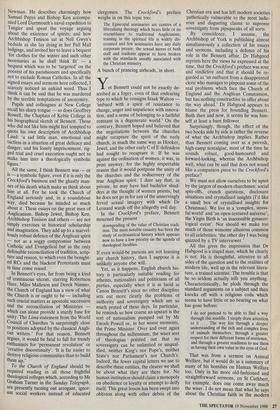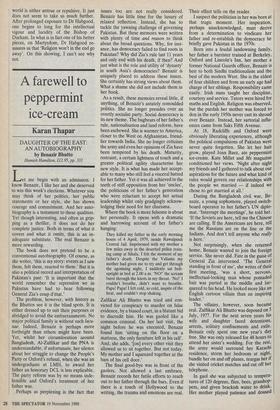BOOKS
Murdered by `nobody'
Ferdinand Mount
TO THE CHURCH OF ENGLAND by Gareth Bennett
Churchman, f5.95, pp.256
CONFESSIONS OF A CONSERVATIVE LIBERAL by John Habgood
SPCK f6.95, pp.229
To the English imagination, clergymen and death bring to mind not so much Hell and Resurrection as Agatha Christie and Margery Allingham. When Canon Gary Bennett was found dead in his car just before being named as the author of the anonymous preface to Crockford's Clerical Directory, many newspaper readers found it hard to accept that this was the end rather than the beginning of the mystery. Would a mere Church historian have known how to connect the rubber pipe to the exhaust? And what about the Canon's dead cat?
The real story seems to have been simpler and sadder. This remarkable memorial volume of his essays does, I think, provide the key, but not quite in the way that either Canon Bennett's friends or his critics have tried to explain his suicide. `It is therefore a fortunate circumstance,' he wrote at the beginning of that fatal essay, here included in full, 'that there exists a longstanding custom that each edition of Crockford's directory should have an anonymous Preface in which Anglican affairs are subjected to the scru- tiny of a writer who is given complete independence.'
`Fortunate' is exactly what it was not. If one is looking for a culprit in the case, it is Anonymity. If the preface had not been anonymous, Bennett would not have writ- ten as freely as he did; and if it had not been anonymous, the newspapers would have taken only a passing interest in yet another attack on the Archbishop of Can- terbury.
The cloak of darkness both titillated Fleet Street and lured Bennett to indulge his not inconsiderable waspishness at the expense of his fellow-clergy. Of the Bishop of Durham, he said: 'The appointment of a man of such imprecision of mind and expression under the guise of being a theologian was a minor Anglican disaster.' Even while endorsing the ideas of his High-Church ally, the Bishop of London, as being 'securely in the mainstream of Anglicanism,' he could not help comment- ing on Dr Leonard's 'predilection for popish outfits'. But it was his long passage on Archbishop Runcie which drew the headlines and which was not, whatever Canon Bennett's friends may say, wren- ched out of context. On the contrary, it was couched in the classic mode of the hatchet job. After listing a few of Dr Runcie's plus points — warmth, hard work — Bennett really lays into him:
It would therefore be good to be assured that he actually knew what he was doing and had a clear basis for his policies other than taking the line of least resistance on each issue. He has a major disadvantage in not having been trained as a theologian, and though he makes extensive use of academics as advisers and speechwriters, his own position is often unclear. He has the disadvantage of the intelligent pragmatist: the desire to put off all questions until someone else makes a deci- sion. One recalls a lapidary phrase of Mr Frank Field that the archbishop is usually to be found nailing his colours to the fence.
Dr Runcie was accused not merely of lack of principles but of a kind of cheap, manipulative, conspiratorial approach to church appointments: His clear preference is for men of liberal disposition with a moderately Catholic style which is not taken to the point of having firm principles. If in addition they have a good appearance and are articulate over the media, he is prepared to overlook a certain theological deficiency. Dr Runcie and his closest associates are men who have nothing to prevent them following what they think is the wish of the majority of the moment . . . One thing cannot be doubted: the personal connection of so many appointed with the Archbishop of Canterbury himself. A brief biographical study will reveal the remarkable manner in which the careers of so many bishops have crossed the career of Dr Run- cie: as students or colleagues at Westcott House and Cuddesdon, as incumbents or suffragans in the dioceses of St Albans or Canterbury, or as persons working in reli- gious broadcasting at a time when he was chairman of the Central Religious Advisory Committee of the BBC and IBA. There is indeed no more fertile recruiting ground for the new establishment than Broadcasting House. Though one may accept that an archbishop should have an influence on appointments, it is clearly unacceptable that so many are the proteges of one man and reflect his own ecclesiastical outlook.
I quote at such length to remind ourselves just how bitchy the attack was. That was the tragedy of it. In his calmer moods, there was no clergyman Bennett would have been more reluctant to cause pain to than Robert Runcie, whom he first met at theological college. Of all the priests he came across during a somewhat lonely life, there were few he was fonder of or who were nicer to him:
He was the one member of staff who actually seemed to think that it was a good thing that I was an academic, and we had a number of humorous conversations . . . He thought that all priests should have a secular side to them, and a false or intense piety was an enemy to real religion. He took a kind of benevolent oversight of me which was more that of equal to equal than I deserved. He was always cheering me up by asking my advice on this or that theological problem. I became quite devoted to him, and my diary is full of references to his kindness.
In all his other essays, on the history of the Church of England and on the various obstacles to and prospects for Church unity today, Bennett writes as sweetly and ami- ably as, say, Izaak Walton or Cardinal Newman. He describes charmingly how Samuel Pepys and Bishop Ken accompa- nied Lord Dartmouth's naval expedition to Tangier and spent the voyage arguing about the existence of spirits; and how Archbishop Tenison sat at Nell Gwyn's bedside as she lay dying in her Pall Mall lodgings, and invited her to leave a bequest `for clothes for the winter and such other necessaries as he shall think fit' — a bequest which was to be 'targeted' on the poorest of his parishioners and specifically not to exclude Roman Catholics. In all the signed essays and sermons here collected, I scarcely noticed an unkind word. Thus I think it can be said that he was murdered by the terrible temptations of anonymity. Pupils and colleagues at New College recall his sharp tongue — so does Geoffrey Rowell, the Chaplain of Keble College in his biographical sketch of Bennett. Those who did not like him might feel tempted to quote his own description of Archbishop Laud: 'a sad little man, emotional and tactless in a situation of great delicacy and danger; and his lonely imprisonment, rig- ged trial and cruel execution ought not to make him into a theologically symbolic figure.'
All the same, I think Bennett was — or is — a symbolic figure, even if it is only the Crockford's business and the ghastly man- ner of his death which make us think about him at all. For he took the Church of England seriously and, in a roundabout way, died because he minded so much about it. These essays on the great men of Anglicanism, Bishop Jewel, Bishop Ken, Archbishop Tenison and others — are not Simply exercises in historical scholarship and imagination. They add up to a marvel- lously robust defence of the Anglican spirit — not as a soggy compromise between Catholic and Evangelical but as the only defensible reconciliation of tradition, scrip- ture and reason, to which even the benight- ed RCs and the blackest Protestants must in time come round.
In Bennett's eyes, far from being a kind of continuous sitcom, starring Robertson Hare, Miles Malleson and Derek Nimmo, the Church of England has a view of what the Church is or ought to be — including such crucial matters as apostolic succession and the reconciliation of Ministries which can alone provide a sturdy base for unity. The Lima statement from the World Council of Churches 'is surprisingly close to positions adopted by the classical Angli- can writers.' For that reason, Bennett argues, it would be fatal to fall for trendy enthusiasts for 'permanent revolution' or creative discontinuity'. 'It is far easier to destroy religious communities than to build them up.'
To the Church of England should be required reading in all those frightful theological colleges which, according to Mr Graham Turner in the Sunday Telegraph, are presently turning out arrogant, ignor- ant social workers instead of educated clergymen. The Crockford's preface weighs in on this topic too:
The Episcopal seminaries are centres of a liberalising theology which bears little or no resemblance to traditional Anglicanism; training in the spiritual life is widely dis- counted and few seminaries have any daily corporate prayer; the sexual mores of both staff and students appear to have broken with the standards usually associated with the Christian ministry.
A bunch of prancing airheads, in short.
Yet Bennett could not be exactly de- scribed as a fogey, even of that endearing type to which he consigns Izaak Walton 'imbued with a spirit of resistance to change, anger and impatience with innova- tion, and a sense of belonging to a faithful remnant in a degenerate world.' On the contrary, Bennett hoped and believed that the negotiations between the churches might recapture the spirit of the early church, in much the same way as Hooker, Jewel, and the other early C of E defenders had sought to recapture it. If he was against the ordination of women, it was, in print anyway, for the highly respectable reason that it would postpone the unity of the churches and the rediscovery of the true Anglican spirit. I dare say that, in private, he may have had bachelor shud- ders at the thought of women priests, but he does not go in for any of the unnervingly fervid sexual imagery with which Dr Leonard wards off the allegedly evil day.
In the Crockford's preface, Bennett mourned the present
downgrading of the value of Christian tradi- tion. The most notable casualty has been the study of ecclesiastical history which appears now to have a low priority on the agenda of theological faculties.
If even would-be parsons are not learning any church history, then I suppose it is unlikely anyone else will. Yet, as it happens, English church his- tory is particularly suitable reading for atheists, nationalists and politicians of all parties, especially when it is as lucid as Canon Bennett's since no other discipline sets out more clearly the problems of authority and sovereignty which are so much prated of these days. In particular, he reminds us how coarse an upstart is the sort of nationalism pumped out by Mr Enoch Powell or, in her worse moments, the Prime Minister. Over and over again throughout the millennium, the wiser sort of theologian pointed out that no sovereignty can be unlimited or unqual- ified, neither King's nor Pope's, neither State's nor Parliament's nor Church's. Indeed, the fewer capital letters we use to describe these entities, the clearer we shall be about what they are there for. No human institution should claim a monopoly on obedience or loyalty or attempt to deify itself. This great lesson has been swept into oblivion along with other debris of the Christian era and has left modern societies pathetically vulnerable to the most ludic- rous and disgusting claims to supreme sovereignty from pipsqueaks of all sorts.
By coincidence, I assume, the Archbishop of York is publishing almost simultaneously a collection of his essays and sermons, including a defence of his role in the Bennett affair. Dr Habgood reprints here the views he expressed at the time, that the Crockford's preface was sour and vindictive and that it should be re- garded as 'an outburst from a disappointed cleric who manages to pinpoint some of the real problems which face the Church of England and the Anglican Communion, but has nothing constructive to offer about the way ahead.' Dr Habgood appears to blame the press for hounding Bennett. Both then and now, it seems he was him- self at least a hunt follower.
Surprisingly, though, the effect of the two books side by side is rather the reverse of what the Archbishop implies. Rather than Bennett coming over as a peevish, high-camp nostalgiac, most of the time he sounds robust, good-humoured and forward-looking, whereas the Archbishop well, what can be said that does not sound like a companion piece to the Crockford's preface?
We must not allow ourselves to be upset by the jargon of modern churchmen: social spin-offs, crunch questions, disclosure situations and crystallised insights (I'd like a small box of crystallised insights for Christmas). We live in a 'complex, stress- ful world' and 'an open-textured universe'; the Virgin Birth is 'an inaccessible gynaeco- logical event'. Nor should we make too much of those winsome allusions common to all celebrities: 'the other day I was being quizzed by a TV interviewer.'
All this gives the impression that Dr Habgood is a stupid man, which he clearly is not. He is thoughtful, attentive to all sides of the question and to the realities of modern life, well up in the relevant litera- ture, a trained scientist. The trouble is that he so seldom actually tells you anything. Characteristically, he plods through the standard arguments on a subject and then knocks off with a religious coda which seems to have little or no bearing on what has gone before: I do not pretend to be able to find a way through this muddle. I simply draw attention to it . . . The way lies through a deeper understanding of the rich and complex lives of animals themselves, through a greater respect for their different forms of sentience, and through a greater readiness to see them as having their own value in the eyes of God.
That was from a sermon on Animal Welfare, but it would do as a summary of many of his homilies on Human Welfare too. Only in his more old-fashioned and straightforward sermons, on St Cuthbert, for example, does one come away much the wiser. I do not mean that what he says about the Christian faith in the modem world is either untrue or repulsive. It just does not seem to take us much further. After prolonged exposure to Dr Habgood, one begins to long for the intellectual vigour and lucidity of the Bishop of Durham. In what is in fact one of his better pieces, on Martyrdom, Dr Habgood re- assures us that 'Religion won't in the end go away'. On this showing, I can't see why not.
























































 Previous page
Previous page